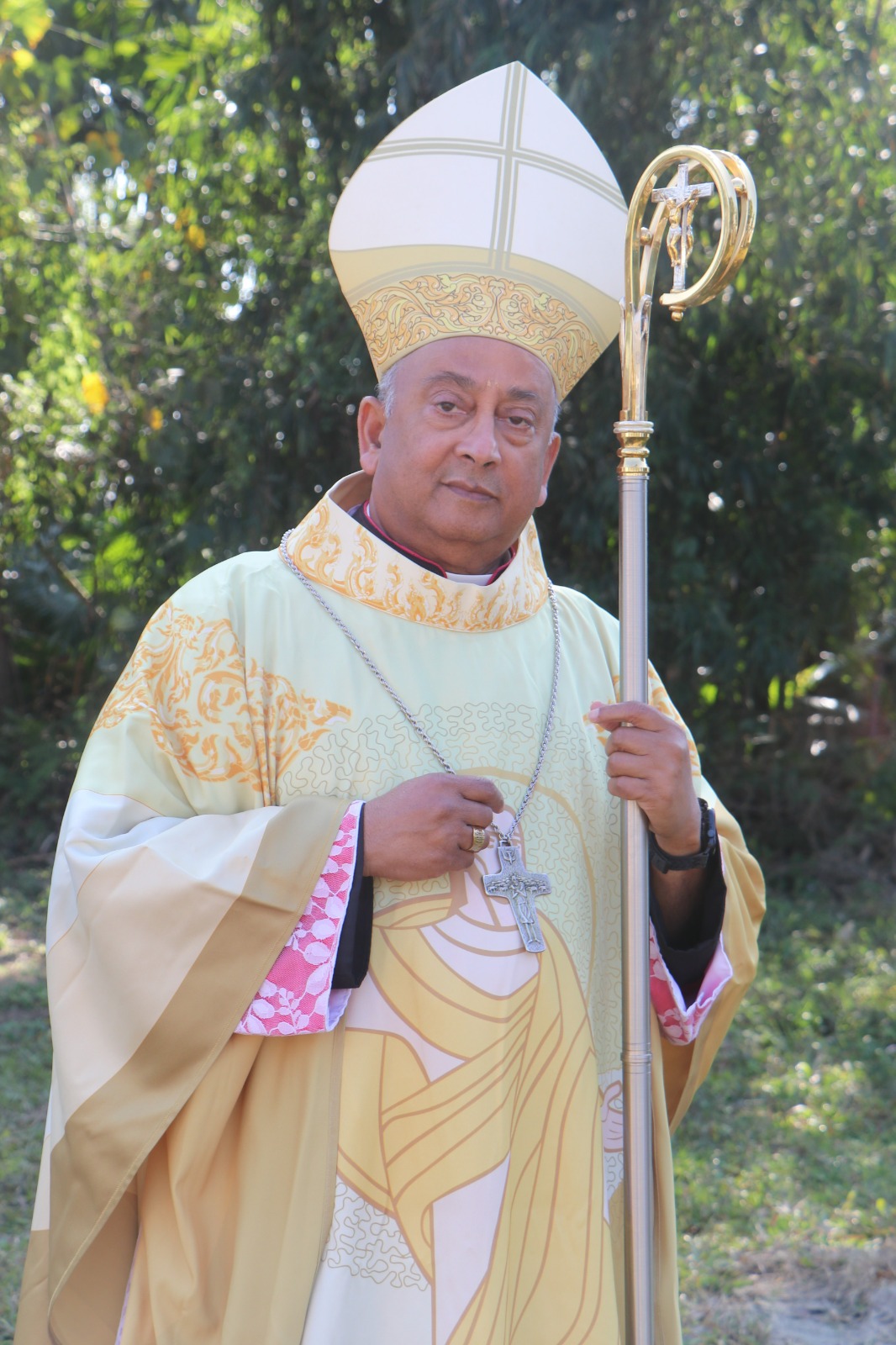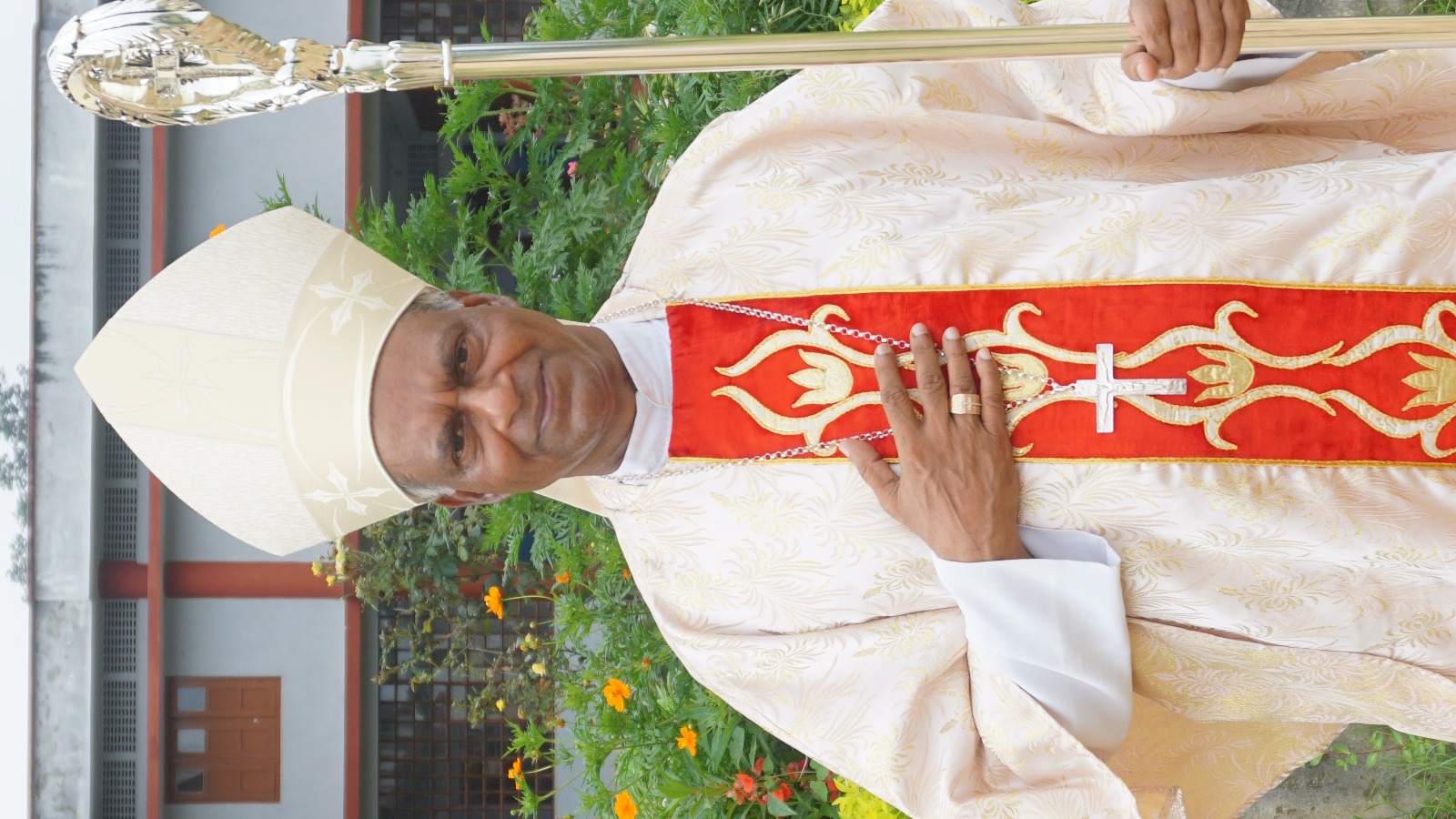
MOST REV. DR. GEORGE PALLIPPARAMBIL SDB
"The Glory of God is Man Fully Alive," declared St. Irenaeus, a revered saint of the second century. This profound
assertion has been the guiding principle in the life and mission of Bishop George Pallipparambil, encapsulating
the very essence of his service to the people of East Arunachal Pradesh.
Bishop George has dedicated over five decades of his life to the people of this region—an unwavering testament to
his selfless love and commitment. Born on 15 May 1954, in the humble village of Mrala in the Idukki District of
Kerala, he was the third child of Mr. Kora and Mrs. Anna Kora. After completing his primary education at St.
Augustine’s School in his native village, young George felt called to a distant land—the North East of India—a
place that would become his home, his mission, and ultimately, his life’s purpose.
While pursuing his secondary education in Shillong, the seeds of love for Arunachal Pradesh and its people began to take root in his heart. This love led him to the Bosco Bible School in Tinsukia, Assam, in 1983, where he received his first pastoral assignment as a newly ordained priest. This experience further deepened his desire to serve the people of Arunachal Pradesh.
In 1992, he became the first resident Catholic priest in Arunachal Pradesh by establishing a school and a boarding facility in Borduria, a village near Khonsa in Tirap District. Borduria soon emerged as a beacon of light and hope for the remote villages bordering Myanmar.
A visionary by nature, Bishop George believed that true human flourishing—and thereby the glory of God—could only be
achieved through education. This conviction drove him to establish numerous schools in remote and inaccessible areas,
often separated by rivers and treacherous roads. Yet, no hardship could deter his mission to make his people "fully
alive."
His vision extended beyond education to encompass holistic development. In 2000, he founded the Newman Educational Society
(NES) to promote education in East Arunachal Pradesh. Today, NES runs 53 schools across eight districts, educating more
than 18,000 students with the support of 1,450 dedicated teachers. Most of these schools are equipped with separate
boarding facilities for boys and girls, as students often travel 15–20 kilometers from their villages. “These boardings
are, in a way, extended classrooms,” says Bishop George. “Here, students learn discipline, courtesy, and teamwork. Our
mission is to educate, not merely to teach.”
Understanding the cultural richness of the region, he also established the Agency for Culture and Human Resource and
Environment Development (ACHRED), a registered society committed to preserving the tribal identity of the people. His
doctrinal thesis—“Indigenous Faith and Culture of the Tribes of Arunachal Pradesh”—reflects his deep academic and
personal interest in the diverse cultural traditions of the region. His work earned him a permanent membership in
the American Biographical Institute.
To address the developmental and healthcare needs of the region, Bishop George founded Seva Kendra Arunachal East, a
registered NGO. Its training center in Namphai I, Changlang District, imparts life-skill training in carpentry,
embroidery, tailoring, weaving, candle making, and more. It reaches out to school dropouts, equipping them with
skills that make them employable and self-reliant. Under his leadership, Seva Kendra has emerged as a leading
organization in the field of community healthcare.
Bishop George has consistently encouraged the tribal youth to become leaders and agents of change. He identifies promising
young individuals and facilitates their higher education and civil service preparation in cities like Bangalore, Shillong,
and Guwahati. “The success or failure of a society,” he often remarks, “is measured by the number of leaders it produces.”
In recognition of his extraordinary service, the Catholic Church appointed him as the first Bishop of the Diocese of Miao
on December 7, 2005. Since then, he has expanded his mission even further. A significant milestone was the establishment
of the first Catholic degree college in Namsai District in 2014, reinforcing his commitment to higher education.
Bishop George is also deeply attuned to environmental concerns. He has pioneered the practice of gifting saplings instead
of bouquets at public events—a symbolic gesture that has garnered both national and international acclaim. “We must
protect and promote ecology,” he urges. “For when the last tree is cut, the last fish caught, and the last river
poisoned, we will realize we cannot eat money.”
His contributions have received prestigious accolades. On 13 April 2018, he was conferred the Bharat Gaurav Award at the
British Parliament’s House of Commons in London by the Sanskriti Yuva Sanstha. That same year, the All India Council
of Human Rights honoured him with the 8th International Human Rights Award for his tireless efforts in uplifting the
marginalized communities of Arunachal Pradesh.
Having devoted more than 50 years of selfless service to the people of this region, Bishop George remains an enduring symbol of compassion, vision, and faith. When asked about the source of his strength and relentless drive, he humbly replies with a smile,
“I shall not pass this way again. Any good I can do or any kindness I can show, let me not defer or neglect it, for I shall not pass this way again.”
These words capture the spirit of Bishop George Pallipparambil—a man who lives his mission fully, bringing to life the glory
of God through the transformation of countless lives.

Most Rev. Dennis Panipitchai SDB, Auxiliary Bishop of Miao Diocese
Most Rev. Dennis Panipitchai, SDB, was born in Colachel, in the Diocese of Kottar (Tamil Nadu), on 27 July, 1958.
After attending St. Mary’s Parish School in Colachel, in 1976 he entered the pre-novitiate of the Salesians in
Shillong, and there he did his novitiate in 1979. On 24 May, 1980, he made his first profession as a simple
brother. Later he felt the call to priesthood and did his philosophy formation at Divyadaan Salesian Institute
of Philosophy, Nashik. He continued with theology at Sacred Heart Theological College, Shillong. He obtained a
Master’s degree in Theology and in a civil subject. After making his solemn profession, on the same day he was
ordained Priest, on 27th December, 1991.
Prior to his Episcopal Ordination as Auxiliary Bishop of Miao Diocese, he served in the following ministries: Dean
of Studies, Salesian pre-novitiate, Rua Home, Jorhat, Dibrugarh (1992-1995); Administrator of Don Bosco Bible
School, Tinsukia, Diocese of Dibrugarh (1995-1997); In-charge of Don Bosco School, Borduria, now in the Diocese
of Miao (1998-2000); Principal of Don Bosco School, Miao and Assistant Priest in the same Parish, Archdiocese
of Imphal (2001-2004); Parish Priest at Mary Help of Christians Church, Borduria, now in the Diocese of Miao
(2004-2009); Principal of Don Bosco School, Kohima (2009-2015). Since 2015 he is Parish Priest of Mary
Immaculate Parish, Chingmeirong, in the Archdiocese of Imphal. Since 2012 he is also Provincial
Counsellor.
His Episcopal Ordination was held at Mary Help of Christians Church, Borduria in Tirap District of Arunachal
Pradesh on 2 August 2018.